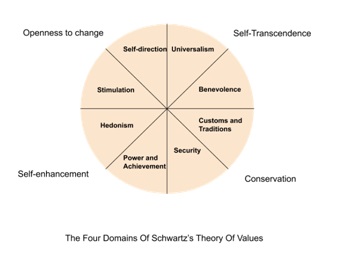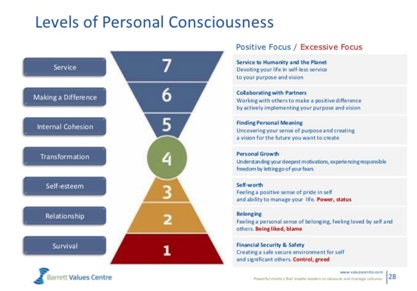
Research Paper By Floor van Baal
(Life Coach, NETHERLANDS)
General
Values are broadly classified into three types. Personal values, Social values, and Universal values.
In coaching the focus is on personal values. Personal values define who we are, what we want, and why we think the way we do.
While working with values and searching for resources I found out there are different tests, methods, and tools to use and there are many studies around human values. To create more clarity for me as a couch around values I decided to write my paper around this topic. In this paper, I will explain why values are important. The main part is to compare some practical ways to discover values to be used with coaching clients. I will research the different methods and how to work with clarifying values in coaching.
The two main questions I will answer are:
-
Why clarifying values is important?
Open your arms to change, but don’t let go of your values. (Dalai Lama.)
Personal values are important in coaching for self-analyses. Values identification is the foundation. It creates a level of self-awareness that helps us make wise decisions and become aligned with what truly matters. As a coach, I will always try to let the client clarify their values. Many clients come to coaching because they are not satisfied with their life and want to change something. They often lack a clear purpose in life and are not always aware of what their core values are. They do not realize that living in harmony with their values affects their happiness. The understanding of our values is the foundation of everything that we create in our lives. If you want to change, make sure your actions are aligned with your values. Exploring and define a client’s values is therefore important in coaching.
Psychologists believe in the transformative power of values. Studies have shown that ethics and values can change our inner world and alter the way we perceive and react to stimuli. For example, a person who has regard for honesty will genuinely reflect the same in his actions. He is less likely to engage in behaviors such as lying, stealing, cheating, or using any unfair means to accomplish his goals. Whether personal, professional, social, or life-oriented, values make room for knowledge, wisdom, and heightened self-realization. They are unique and individualized. We all choose different combinations of values in life, and these choices shape our actions and life decisions. Clarifying values is a great way to prioritize our life goals and understand what we truly desire to become.1
To be successful it is therefore not only important to know our core values but it also important that we live our values and not someone else’s. When we make decisions that are not based on our values, the outcome feels empty, or we can feel uncertain. We may try to ignore and suppress this feeling but then won’t live our own lives and we will feel unsatisfied2.
-
Different methods for clarifying values
In coaching, we can use several exercises, tests, and tools that can help you find your values. You can choose from different (online) assessment to find out what your values are. For example, the Barrett Values Assessment 3 is commonly used. You can make this test online and receive a personal report. And there are many more (free) online tests. I will describe the three most commonly used assessments. A lot of free online tests are derived from these value assessment studies. I will also explain about lists of values to use in coaching, the value game, and the use of role models. Asking powerful questions to find out what values are important and why are of course very important.
The Valued Living Questionnaire
The Valued Living Questionaire (VLQ)4 originally evolved as part of the Acceptance and Commitment Therapy. Nowadays it is a widely accepted tool of measuring life values that influence our actions. Some scientists working on Acceptance and Commitment Therapy initially created the VLQ. They found that valued living was a vital component for the successful implementation of radical self-acceptance and commitment to positive changes. The VLQ asks a series of questions about what your values are and how much you have been living by them.
The principle theory of value revolves around the concept of a ‘value system’. A set of deep-rooted standards that form the foundation of our actions and life choices. Our values are built on ten domains of living. These ten areas include:
- Family
- Marriage and intimate relationships
- Parenting
- Friendshipandinterpersonalrelationships
- Professional life
- Academic life
- Leisure and recreation
- Spirituality
- Citizenship
- Self-care
The VLQ is a simple self-report measure that emphasizes on the values that are unique to us. It also explores how valued living across the ten domains of life have influenced our actions over the past few days. The responses are scored on a 10-point scale that indicates how significant the particular value is to us. The VLQ assesses three main things6:
- Identifying the domains of valued living that we think are most important to us.
- Suggesting how the domains influenced our actions over the past week.
- Evaluating the degree to which our actions are consistent with our values.
You can find this test online or follow the link.
https://www.div12.org/wp-content/uploads/2015/06/Valued-Living-Questionnaire.pdf
The Portrait Value Questionnaire
Another internationally important theory is from Shalom Schwartz. This theory tells us that ten broad value domains are universal and fairly comprehensive. Lists of personal values can be indefinite but his research has shown value will generally fit into one of the ten types as Schwartz in 1992 presented7.
Schwartz and his colleagues explained that ten fundamental individual values influence human actions at any point. These ten types of values are:
- Self-directional values– that define our goals and ambitions in life.
- Stimulative values– that provide the energy and vigor to move ahead for accomplishing the aspirations.
- Hedonistic values– that operate on the pleasure principle and instant need gratification.
- Achievement values– that define personal success and competence.
- Power values– that come with societal norms, control, and personal resources.
- Security values– including personal safety, harmony, interpersonal relationships, and self-control.
- Conformity values – that operate through agreeableness to societal norms and standards.
- Traditional values – involving respect, community support, commitment, and acceptance of customs and culture.
- Benevolent values – that is tied in with preservation and enhancement of the welfare of self and others close to us.
- Universal values – that encompass appreciation, tolerance, and general acceptance of the nature of things around us.
These ten values are organized into four domains:
- A self-directional domain that operates on openness and flexibility to change.
- A universal value domain that is influenced by transcendence.
- Traditional values domain that is motivated by the laws of conservation.
- Power value domain that is governed by self-enhancement.

 Schwartz Theory of Basic Values
Schwartz Theory of Basic Values
The Portrait Values Questionnaire (PVQ) is based on Schwartz’s theory of values. The assessment comes with several statements about how we feel about ourselves and others. Respondents rate each statement according to what they think is most appropriate for them. The results explain which of the four domains play a predominant role in the individual’s life and also suggests how to make the most of it. It is a universal measure of personal value systems and carefully evaluates the underlying causes of our actions and perceptions8.
The Portrait Value Questionnaire is a straightforward assessment. The respondents compare themselves to each portrait value and identify how much it resonates with them on a 6-point scale.
You can access the online test or follow the link.
https://datadatabase.files.wordpress.com/2011/03/schwartz-value-inventory.pdf
The Personal Values Assessment
The Personal Values Assessment (PVA) is a straightforward measure of determining our core values and personal belief system. The theoretical orientation of the test suggests that self-image, self-acceptance, and our life goals are all aligned to our core personal values. It is based on the Barrett Seven Levels Model. The work of Richard Barrett and inspired by Abraham Maslow’s Hierarchy of Needs.
The model identifies the seven areas that comprise human motivations (the seven areas of personal consciousness). These range from basic survival at one end to service and concern for future generations on the other9.

The PVA is a quick survey that takes five to ten minutes to complete. It provides a detailed estimate of the causal factors behind our internal drives and decision-making abilities. The test allows us to understand what we think is important to us and how this corresponds with our daily activities. Also, the order of responses determines the importance of personal values in our lives.
The test lets us realize what our core values are and why we act or react in accordance to them. The form is simple and objective and provides a linear evaluation of how aligned we are to our internal values and judgment at present.
You will receive a detailed result with an explanation follows after completion of the form. This helps us understand how connected we are to our internal standards.
You can take the online test or follow the link. https://survey.valuescentre.com/survey.html?id=5l1OmCPgJO6FGafKLmkogR4E3lIuZOgB0EGag0Ki1CIOvC8MbC5eSA
Asking Powerful Questions
As a coach, you can ask your client to complete a value test and ask questions about the results or the outcome. But even if there is no test result you can coach around values and try to clarify them with your client.
A coach can simply help a client to dig deep and find their values by asking powerful questions:
- What is most important to you in life?
- What makes things valuable for you?
- Where do you spend the best of your time and energy?
- What are your deep concerns?
- What most excites you in life?
- What guiding principles or standards do you live by that create the choices you make?
- Think about your actions. What decisions have you made to get you to where you are today?
- What personal values resonate most with you to live a great life?
2.5 List of Values
In coaching, there are several exercises and tools to use that can help you find your values. A list of values is one of the tools that can help to clarify your core values. You can find many value lists online. For instance, you can use this list of Dr.Brown.
In Dare to Lead, Brené Brown presents a list of values10. The list includes a set of over 100 values like accountability, achievement, balance, competence, excellence, family, giving back, joy, legacy, order, patience, recognition, resourcefulness, travel, wealth, and wisdom. You can also add your values. The exercise is to narrow this large list of values down to your two core values.
Furthermore the research of Brené Brown shows11:
As BrenéBrown describes, reducing the list to just two values is universally difficult. Most people will identify with 10 or 20 values. However, if many values on the list are important to you, then nothing is truly a driver. The most difficult work comes in focusing on the list of values that you identify with down to just two. It is important to prioritize the values and choose the most important. According to Brené Brown, you only need two values.
I created my values list where you choose and prioritize five values from a list of many different values. It is short and quick and will take you less than ten minutes. Prioritizing your values is an important step.
Value game ICA
This is an exercise from ICA that ICA students use to first understand themselves and their values and then use it with their clients12. As you read the following set of concepts make a note of what resonates with you.
Click here to download the worksheet or follow the link. https://archive.coachcampus.com/resources/coaching-101/the-values-game/
The objective is to select your top five values and define what each one means to you. This could be a beautiful start to having a better understanding of who you are, what your values are, and how your life is built.
Role models
Discussing role models can also be an effective tool for working with values. Ask the client about their role model and specifically what they value about this role model. The best life lessons you learn will likely come from your role models. From someone who, through actions, values, and behavior shows you what is possible. From someone you admire and someone, you aspire to be like.
There’s an old saying that says ‘the example you set is the example you get’. Aristotle taught that ‘We learn by practice and the best practice is to follow a model of the virtuous person.’
Research your role models and identify what you can learn from them, how they live their lives, and how they accomplished their goals. What values are important to them? What makes them successful in your opinion? Try to learn to form them and apply them in your own life by living up to these values.
Conclusion
By studying different tools and ways to work in coaching around values, I learned a lot and also about the theoretical methods behind the tools. Bur, moreover it inspired me to use more different tools than the one I used to work with and it is very helpful to have a pallet to choose from. You can also work with different tools that will match the client better. Or you can more than one tool and start with an assessment for instance followed by discussing a role model to get a real understanding of how values show up in a person’s life.
After the value exercise let your client look at her values and ask:
- Do your values resonate with what you thought you wanted to achieve?
- Do you live your life in alignment with your values?
- How are your values reflected in your daily life?
- Are you spending your time on things that matter to you?
- What is the connection between your values and your goals?
- What impact has this value on your life or goal?
- Are you living your values or are these values of someone else?
- What would you like to change around your values?
- Or would you change your actions or decisions to better match your values?
It’s not hard to make a decision once you know what your values are. (Roy E. Disney).
Resources
https://positivepsychology.com/values-questionnaire/
Wilson, K. G., Sandoz, E. K., Kitchens, J., & Roberts, M. (2011). The Valued Living Questionnaire: Defining and measuring valued action within a behavioral framework.The Psychological Record, 60(2), 4. Link to PDF.
Hayes,1999; Hayes, 2004
VLQ; Wilson, 2002
Sagiv L, Roccas S, Cieciuch J, Schwartz SH. Personal values in human life. Nature Human Behaviour. 2017 Sep;1(9):630
Schwartz, Melech, Lehmann, Burgess, and Harris, 2001
Seven Levels of Personal Consciousness
https://daretolead.brenebrown.com/wp-content/uploads/2019/02/Values.pdf
https://daretolead.brenebrown.com
https://archive.coachcampus.com/resources/coaching-101/the-values-game/